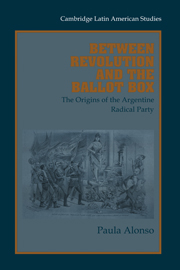Book contents
- Frontmatter
- Contents
- Acknowledgments
- List of Abbreviations
- List of Tables and Figures
- Introduction
- 1 The Political Arena
- 2 Mounting an Opposition
- 3 The Short-Lived Unión Cívica
- 4 The Radicals in Action: Part I
- 5 The Radicals in Action: Part II
- 6 The Decline of the Radical Party
- Conclusion
- Appendix 1 A Chronology of Political Parties and Factions, 1862–1910
- Appendix 2 Details of the Members of the National Committee of the UCR in 1892
- Appendix 3 Property Values in Buenos Aires, 1890–1898
- Bibliography
- Index
5 - The Radicals in Action: Part II
Published online by Cambridge University Press: 05 August 2011
- Frontmatter
- Contents
- Acknowledgments
- List of Abbreviations
- List of Tables and Figures
- Introduction
- 1 The Political Arena
- 2 Mounting an Opposition
- 3 The Short-Lived Unión Cívica
- 4 The Radicals in Action: Part I
- 5 The Radicals in Action: Part II
- 6 The Decline of the Radical Party
- Conclusion
- Appendix 1 A Chronology of Political Parties and Factions, 1862–1910
- Appendix 2 Details of the Members of the National Committee of the UCR in 1892
- Appendix 3 Property Values in Buenos Aires, 1890–1898
- Bibliography
- Index
Summary
The successive military defeats experienced in the revolutions of 1893 marked a turning point in the history of the Radical Party. Its revolutionary rhetoric gave way to a softer language. El Argentino, the vigorous mouthpiece of the UCR, was replaced by El Tiempo, a moderate newspaper, and the party concentrated its efforts on electoral politics rather than revolution, emphasizing economics above politics as the party's main banner of campaign. The authority of the senior party leaders was challenged. In the aftermath of the revolutionary defeat, the Radical Party suffered from internal divisions and resentment among its members. This, in turn, affected the UCR's performance in Congress, its electoral performance, its internal organization, and, ultimately, its survival.
The transitional period of the UCR, between 1893 and early 1896, has been largely ignored by historians whose accounts tend to jump from the revolutions of 1893 to the disbandment of the party in 1897. However, it is a fundamental period for the fortunes of the party. Its final crisis was not directly due to defeat in the revolutions of 1893. It was principally the result of the radicals' failure during this transitional stage to overcome internal difficulties and to adapt the revolutionary party to a new postrevolutionary era.
This chapter begins by analyzing the series of internal difficulties that the UCR experienced between September 1893 and the end of 1895. After the military defeats, revolution ceased to be an acceptable vehicle for change in Argentine politics.
- Type
- Chapter
- Information
- Between Revolution and the Ballot BoxThe Origins of the Argentine Radical Party in the 1890s, pp. 133 - 178Publisher: Cambridge University PressPrint publication year: 2000

